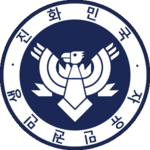Government of Zhenia: Difference between revisions
mNo edit summary |
mNo edit summary |
||
| Line 65: | Line 65: | ||
* [[Ministry of Industry and Resources (Zhenia)|Ministry of Industry and Resources]] | * [[Ministry of Industry and Resources (Zhenia)|Ministry of Industry and Resources]] | ||
** [[Zhenia Patents Administration]] | ** [[Zhenia Patents Administration]] | ||
** [[Federal Commission of SME and Startups (Zhenia)|Federal Commission of SME and Startups]] | |||
* [[Ministry of Culture, Tourism and Sports (Zhenia)|Ministry of Culture, Tourism and Sports]] | * [[Ministry of Culture, Tourism and Sports (Zhenia)|Ministry of Culture, Tourism and Sports]] | ||
Revision as of 20:23, 8 March 2020
| Government of the Greater Eastern Union | |
|---|---|
| 대동진국연방정부 | |
| Overview | |
| State | |
| Leader | Premier |
| Appointed by | Chancellor |
| Main organ | Federal Council |
| Ministries | See Ministries |
| Annual budget | $4.817 trillion |
| Headquarters | Capital District, Donggyeong, Zhenia |
| Website | www.zhen.gov |
The Government of the Greater Eastern Union (Zhenian: 대동진국연방정부), or commonly the Government of Zhenia (Zhenian: 진국 정부) or even the Union Government ((Zhenian: 연방정부), is the executive branch of the government of Zhenia. Constituted by the appointments of the Chancellor and subject to the confidence of both branches of the Parliament, it consists of the Premier, ministers of respective governmental departments and their deputies.
Overview
Current Government
Composition and structure
Functions
Ministries
The Government of Zhenia is organized into multiple ministries, separated by their own fields of responsibility and expertise. Each ministry is headed by a Minister, who is appointed by the Chancellor and report to the Premier, and supported by a deputy minister; some ministries also have affiliated agencies that report to both the Premier and the affiliated ministry. Although the necessity of such ministries in government is held sacrosanct by law, each individual government retains the right to change the name, function and structure of said ministries under the precondition that such changes are within the realm of the law and the constitution.
Ministers of the government's ministries can assume the position of Premier as listed below, in case the Premier cannot perform his duty and the Chancellor cannot assume the position of Premier. The Minister of the Interior and the Minister of the Economy and Finance are particularly assigned Vice Premier roles to assist and possibly assume the role of Premier; if this is not the case, the Chancellor retains the right to nominate any of the remaining ministers to assume the roles of Premier in the order disclosed below.
- Ministry of the Interior
- Ministry of the Economy and Finance
- Ministry of Education, Science and Technology
- Ministry of Justice
- Ministry of Foreign Affairs and Trade
- Ministry of Defense
- Ministry of Health and Welfare
- Ministry of the Environment
- Ministry of Energy
- Ministry of Employment and Labor
- Ministry of Territories and Transportation
- Ministry of Agriculture, Food and Rural Affairs
- Ministry of Industry and Resources
- Ministry of Culture, Tourism and Sports
Independent Agencies
Although some agencies are under the command of the Premier, who is the chief of the executive branch, the Chancellor retains control over some governmental agencies that directly report to the Chancellor:
